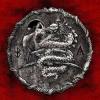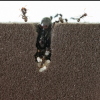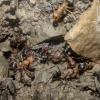How do they feel about roaches? Will they eat them?
- Formiculture.com
- Forums
- Gallery
- Members
- Member Map
- Chat

How do they feel about roaches? Will they eat them?
I know some people say that P. imparis aren't polygynous up here in northern Iowa, however, I have successfully formed a two queened colony by adding a queen to an already established 6 worker colony.
Also, will they eat fruit flies? I would like to feed them those because I'm breeding them, so they are readily available, but if not I can still catch other insects.
Why keep ants that aren't found in your yard?
There are so many fascinating ants right were you live!
I disagree with the keeping/buying of ants that are not found in your area.
antperson24, on 29 Jun 2023 - 6:14 PM, said:
I know some people say that P. imparis aren't polygynous up here in northern Iowa, however, I have successfully formed a two queened colony by adding a queen to an already established 6 worker colony.
Also, will they eat fruit flies? I would like to feed them those because I'm breeding them, so they are readily available, but if not I can still catch other insects.
fruit flies are the best protein source for small colonies, so i assume so. Larger insects have a habit of molding in ants outworlds...
Go to the ant, you sluggard; consider its ways and be wise! It has no commander, no overseer or ruler, yet it stores its provisions in summer and gathers its food at harvest. -Proverbs 6: 6-8
My Ant Shop Here I have PPQ-526 permits to ship ants nationwide
Attention Ant-Keepers in South Dakota! Join the SoDak(Society Of Dakotan Ant Keepers)
Ants_Dakota, on 30 Jun 2023 - 2:51 PM, said:
antperson24, on 29 Jun 2023 - 6:14 PM, said:
fruit flies are the best protein source for small colonies, so i assume so. Larger insects have a habit of molding in ants outworlds...I know some people say that P. imparis aren't polygynous up here in northern Iowa, however, I have successfully formed a two queened colony by adding a queen to an already established 6 worker colony.
Also, will they eat fruit flies? I would like to feed them those because I'm breeding them, so they are readily available, but if not I can still catch other insects.
Alright, I've heard people say yes, others say no.
Why keep ants that aren't found in your yard?
There are so many fascinating ants right were you live!
I disagree with the keeping/buying of ants that are not found in your area.
DARK & QUIET AND THEY DO BETTER AND EVEN MOVE THEMSELVES
For encouraging colonies to combine, and possibly for getting colonies to move out of dry tubes, it seems to help to offer them a totally dark and quiet setting.
My first year I tried and tried to get my Prenos to move out of very moldy tubes, and nothing worked short of slamming the tube and knocking them out.
I have since learned (slowly) that Prenolepis prefer being in the dark and being left alone, far more than any other species I've kept.
I have put two test tube colonies into the same outworld and, IN THE DARK AND QUIET, one colony moved over and merged colonies.
There's a YouTube video of someone doing exactly the same thing. Leave them alone in the DARK they are more likely to move.
Also, my Preno colonies never thrived UNTIL I learned to LEAVE them in a very dark, vibration-reduced drawer. (Except winter, when they go into the cooler garage (non-freezing).) Again, none of my other colonies are this sensitive.
However, they suck at cleanup and I do have to check once a week to feed/water/nectar and clean out moldy food from their test tube.
POLY? OR LONG-TERM MONO? JUST WONDERING. NO IDEA.
Also, that colony that combined eventually lost all its queens except one, which has survived into its 3rd year. I do not know if they get culled, underfed, or if it's just natural mortality rate. I've had several colonies of different ant species that are supposed to be poly, except somehow over the space of a year or two, all the queens die off except one. So they SEEM poly except somehow I'm always left with a single-queen colony. (The exception has been an Acromyrmex colony.) Or maybe I'm just a mediocre ant keeper (which is also quite likely).
Edited by OhNoNotAgain, February 26 2024 - 7:39 AM.
Formiculture Journals::
Veromessor pergandei, andrei; Novomessor cockerelli
Camponotus fragilis; also separate journal: Camponotus sansabeanus (inactive), vicinus, laevigatus/quercicola
Liometopum occidentale; Prenolepis imparis; Myrmecocystus mexicanus (inactive)
Pogonomyrmex subnitidus and californicus (inactive)
Tetramorium sp.
Termites: Zootermopsis angusticollis
Isopods: A. gestroi, granulatum, kluugi, maculatum, vulgare; C. murina; P. hoffmannseggi, P. haasi, P. ornatus; V. parvus
Spoods: Phidippus sp.
RedFox, on 10 Sept 2024 - 12:41 PM, said:
Yes, this is probably the best way to keep these ants. Jplelito has kept a colony for years in a planted aquarium.Has anyone tried a natural habitat for them? I only have one colony, so I don't want to try a natural setup, I will wait until I can get more colonies.
I stumbled or this forum while trying to understand Prenolepis imparis ants.
My intention is not to hijack this tread but I'm not sure where else to post my questions. My apologies if I'm not posting this in the correct thread.
I have learned some interesting things about P imparis except I'm coming from the opposite direction. I'm not looking for ways to grow a colony. I'm trying to find out how to make them go elsewhere or eradicate them. I live in Toronto, Canada and have had my first ever infestation of prenolepis imparis in my basement. I can't locate where they are entering my house or what food source they may have located or are searching for. I don't see other insects in my basement. Based on what I've read the most likely food would seem to be rotting fruit but I can't locate any in my basement. There are no fruit flies present. I understand they live deep below the surface of the ground and I assume they discovered some cracks in my foundation to enter the basement. My basement is finished and well heated but there are spaces in the baseboards. But since the basement is very well heated (my office is in the basement) I can't understand why they would enter a space about 70 F because they prefer colder temperatures and dark spaces.
I understand they live in colonies.
Q1) My question is how many different colonies could there be under the ground next to my basement?
I tried using ant traps which have 5.4 % Borax active ingredient. Because I have no pets or children in the area I have also sprinkled trails of liquid 5.4 % Borax solution drops along the perimeter of interior walls and other travel pathways. This solution is suppose to be carried back to the colonies and eventually kill the inhabitants. But if there are many many colonies in a small area this strategy may take a very long time. Over the course of 2-3 weeks I don't see a reduction in numbers.
My next thought is to produce an Escape Barrier of Talc powder + denatured alcohol (2 [alcohol] to 1 [talc] to discourage them from entering the house but that plan seems fraught with challenges especially being able to determine their access point or points.
One other product that has been suggested is to sprinkle Diatomaceous Earth powder along the travel pathways of the P imparis.
One other note regarding the weather in Toronto this winter. It has been exceptionally cold since early January and there has not been the typical thaw that usually takes place once every 3-4 weeks most winters. If the P imparis tend to live in the ground below the frost line (4') why would an especially cold winter force them to change their typical behaviour?
Q2) Wouldn't they just move deeper into the ground if the frost line went deeper?
Q3) Do you have any thoughts on my situation that may help me remove or stop the ants from entering my basement?
ANTdrew thank you for your guidance and suggestions regarding my P imparis infestation. I'm trying to take comfort that they should not likely continue residency in my basement beyond the return to warmer weather.
I have a few followup questions:
1) Until recently all the P imparis I encountered moved along the ground or on walls. Recently I encountered an airborne P imparis. Is there a difference between the P imparis that fly and the ones I have not seen fly?
2) And this is a long shot, but if I'm trying to track their movements to possibly locate their access point I wonder if I could sprinkle or spread some compound or material around the places I have found them, and if that dust or other compound could be detected by an ultaviolet flashlight I could track the P imparis's movements. Are you aware of any material that I could use? I know cat urine is very visible under an ultraviolet light but I'm not prepared to source and spread cat urine.
Thanks again for any additional information and/ or guidance.
The winged ants you saw are reproductive individuals, either new queens or males. To track the ants, you could try putting out a bait that will attract them and following any trails back to their entry point.
Market Place →
General Market Place →
Ender Ants: Naturalistic Formicariums & MerchandiseStarted by Ender Ants , Feb 7 2025 |
|

|
||
Anting →
General Anting →
Messor barbarus adopting queenStarted by OliveOilGuy , Sep 23 2024 |
|

|
||
 |
Ant Keeping →
Ant Care Sheets →
Care Sheet - Veromessor pergandeiStarted by dspdrew , Nov 4 2023 |
|

|
|
Formiculture.com →
Member Introductions →
Hi fellow ant-fans, this is Martin from house-of-ants.comStarted by house-of-ants.com , Sep 12 2023 |
|

|
||
 |
Ant Keeping →
Ant Keeping Journals →
Kiedeerk's Epic multi-species Ant Keeping JournalStarted by kiedeerk , Jul 8 2023 |
|

|
0 members, 1 guests, 0 anonymous users